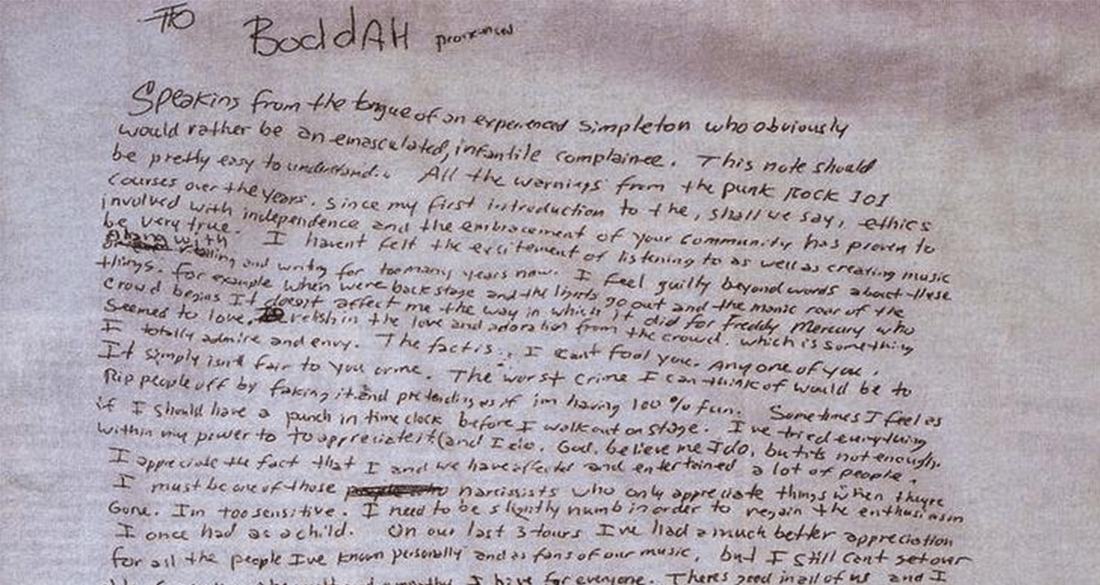The news of Kurt Cobain’s death reverberated through the world like a shockwave, leaving a gaping hole in the hearts of millions. The grunge icon, known for his raw, emotional lyrics and iconic voice, had taken his own life at the tender age of 27. While the official cause of death was ruled as a self-inflicted gunshot wound, a powerful suicide note penned by Cobain offered a glimpse into the turmoil that haunted his brilliant mind. It was a document that transcended the boundaries of mere words, becoming a tragic testament to the struggles of a tortured soul.

Image: www.reddit.com
Cobain’s suicide note, which he painstakingly drafted on April 8, 1994, is more than just a piece of paper. It’s a chillingly poignant document that has been dissected by countless analysts, psychologists, and fans for decades. It reveals the torment he endured, a deep-seated sense of disillusionment with the music industry, the pressure of fame, and the unbearable pain of his declining health. Through his handwritten words, Cobain’s pain leaps from the page, reminding us of the vulnerability that lies beneath even the most iconic figures.
The Raw Words of a Troubled Soul
The suicide note, written in messy handwriting, is filled with a mix of anger, despair, and a poignant yearning for escape. It reflects Cobain’s vulnerability, his struggles with addiction, his disillusionment with fame, and his deep-seated anxieties. It reads like a raw, unfiltered outpouring, a stream of consciousness that lays bare the complex emotions raging within him.
Cobain’s opening line, “To Boddah, I’m afraid I’ve become a hypocrite. I hate when people say, ‘I hate rock’n’roll.’ That’s lame. But the truth is, I don’t like being a part of it anymore,” sets the tone for the note’s deeply personal and introspective nature. It reveals a man yearning for authenticity, a man who is tired of the trappings of fame and the compromises it demands.
The Burden of Fame
Throughout the note, Cobain expresses a deep-seated resentment towards the music industry and the pressure of fame. He writes, “I can’t stand seeing people that I know are basically good people, turned into monsters through the media.” This statement underscores the toll that relentless public scrutiny can take on even the most genuine of individuals.
He also criticizes the media’s portrayal of Nirvana, blaming them for creating a “negative impression of me.” He laments, “I don’t feel I have the right to inflict this pain on them or anyone anymore.” This reveals the deep sense of responsibility Cobain felt for his actions and their impact on those around him.
The Dark Struggle with Addiction
Cobain’s struggles with addiction are also starkly evident in the document. He confesses, “I don’t have the passion anymore” and “I feel like a hypocrite, and I hate myself for it.” These admissions underscore the inner conflict he faced, the struggle to reconcile his artistic vision with the demands of the music industry and the reality of his addiction.
He reveals the excruciating pain he endures, describing it as “a never-ending struggle.” This honest and heartbreaking depiction of his internal battle highlights the severity of the issue and the overwhelming nature of his struggle. Cobain’s raw honesty adds a layer of complexity to his legacy, humanizing him and reminding us that the darkness of addiction can touch even the brightest of stars.

Image: roxx.gr
A Cry for Escape
Throughout the note, a sense of longing for escape permeates every line. Cobain writes, “I don’t have the energy or the inspiration to write songs anymore.” He yearns for a life “free from the pressure of trying to live up to what other people expect me to be.” This deep-seated desire for freedom from the suffocating expectations of fame serves as a chilling and poignant commentary on the human cost of celebrity.
In his note, Cobain’s desperation for an escape from the relentless glare of the spotlight is palpable. He yearns for peace and normalcy, and his frustration boils over in lines like, “I’d rather be a nobody than a fraud.” This yearning for authenticity and a meaningful connection with his inner self forms the central motif that runs throughout the entire note.
A Final Goodbye
The note ends with a heart-wrenching farewell to his wife, Courtney Love, and their daughter, Frances Bean. He writes, “Frances, my sweetheart, when I’m gone, please keep on going and don’t let anyone steal your fire, like I did.” These final words are a testament to his love for his family, a desperate plea for them to find happiness even in his absence. They are also a reflection of his own internal conflict, acknowledging his failure to be the man he believed he should be.
The note concludes with a simple yet powerful sign-off, “I love you, I love you,” revealing a depth of love that cannot be diminished by even the darkness that consumed him.
What Did Kurt Cobains Suicide Note Say
The Lasting Legacy
Kurt Cobain’s suicide note remains a powerful and moving document. It serves as a chilling reminder of the intense pressure that can accompany fame and success and the devastating effects of addiction. But beyond the darkness, it also reveals a man yearning for connection, authenticity, and escape. This powerful document serves as a testament to the vulnerability of humanity, the shared pain of loss, and the enduring impact of Cobain’s legacy on music and culture.
Cobain’s words have resonated with millions, offering a window into the inner turmoil of a troubled soul. While the circumstances surrounding his death remain a subject of speculation, his suicide note provides a glimpse into the fragility of human existence, the complexities of the human condition, and the bittersweet nature of a tragically shortened life. His death continues to be a reminder of mental health’s importance, the need to cherish those around us, and the vital importance of seeking help when we face our darkest moments.






